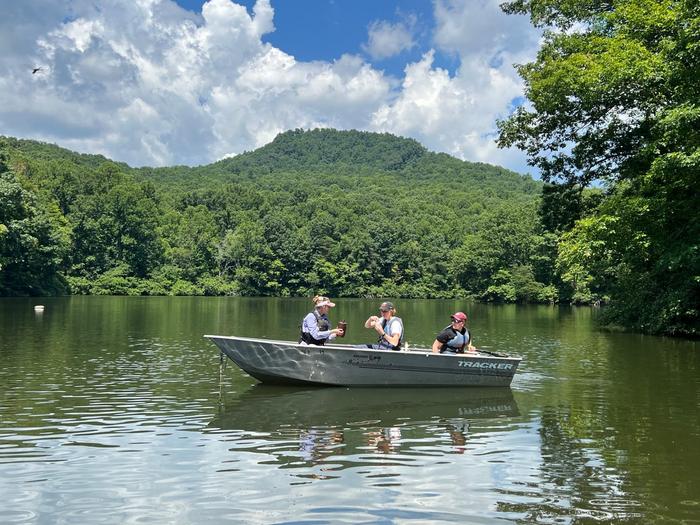Predicting the future of ecosystems requires a plethora of accurate data available in real-time.

Credit: Photo courtesy of Ryan Keverline.
Predicting the future of ecosystems requires a plethora of accurate data available in real-time.
To enable real-time data collection, three Virginia Tech researchers have received a prestigious five-year National Science Foundation grant to help better predict the future of ecosystems.
The $450,000 Long-Term Research in Environmental Biology (LTREB) grant will support the enhancement and continuation of field monitoring and data sharing at two freshwater drinking water supply reservoirs in Roanoke.
This grant will allow the researchers to create a cutting-edge, ecological monitoring program with real-time data access and publishing, which normally takes weeks to years after data collection.
“We are developing one of the first open-source automated forecasting systems in the world by using the reservoirs as a test bed for exploring new data collection, data access, and forecasting methods,” said Cayelan Carey, professor and the Roger Moore and Mejdeh Khatam-Moore Faculty Fellow in the Department of Biological Sciences. “We will use our new designation as an official long-term research environmental biology monitoring site as a platform for scaling and disseminating our data so that other researchers can similarly start to forecast water quality in lakes and reservoirs around the globe.”
The LTREB program is one of the National Science Foundation’s premier environmental science programs to support long-term monitoring at select exemplar terrestrial, coastal, and freshwater ecosystems across the U.S.
Carey leads the Virginia Reservoirs LTREB team with Professor Madeline Schreiber in the Department of Geosciences and Associate Professor Quinn Thomas, who has a joint appointment in the Departments of Forest Resources and Environmental Conservation and Biological Sciences.
With a group of co-mentored students, technicians, and postdoctoral researchers, Carey, Schreiber, and Thomas have been monitoring biological, chemical, and physical metrics of water quality in the two reservoirs for the past decade in partnership with the Western Virginia Water Authority, which owns and manages the reservoirs for drinking water.
“We are delighted to continue our partnership with Virginia Tech researchers to monitor our supply reservoirs,” said Sarah Baumgardner, director of public relations at the Western Virginia Water Authority. “This new project builds on a decade of collaboration and enables us to access real-time data to help us make decisions to produce the best quality drinking water for our customers.”
With this new funding, the Virginia Tech researchers will develop a water quality open forecasting challenge called VERA, the Virginia Ecoforecast Reservoir Analysis. Researchers from around the world are invited to predict a suite of physical, chemical, and biological variables at the reservoirs before the data is collected. To support the challenge, the reservoir data is made immediately available online after collection, which is automatically integrated into forecast model workflows. To date, over 1,300 forecasts have been submitted to VERA for 23 reservoir water quality variables.
“One of the goals of this five-year grant is to predict nature like we predict the weather,” said Thomas, associate professor and data science faculty fellow in the College of Science. “Forecasting is a powerful approach for quantifying ecological predictability; it requires using models that represent our best hypotheses about how ecosystems function to predict ecological conditions into the future and long-term data to evaluate the models.”
Objectives for this study include the following:
- Compare forecasting accuracy between the two reservoirs to determine how varying oxygen conditions alter forecast predictability
- Create novel Findable, Accessible, Interoperable, Reusable (FAIR) data-publishing workflows in collaboration with the Environmental Data Initiative to advance reproducibility in ecology
- Enable the scaling of ecological forecasting to other sites globally
- Broaden the participation of students from historically excluded groups in environmental data science education
- Disseminate forecasts to water utilities in real time to enable their immediate use as decision-making tools for water management
“We work really closely with the Western Virginia Water Authority to collect and share data to help them interpret how the water quality is changing, which they then use to help guide drinking water decisions for Roanoke and the surrounding area,” Carey said.
Carey and Thomas, who are the co-directors of the Center for Ecosystem Forecasting and are affiliated with the Fralin Life Sciences Institute and the Global Change Center, have also received a National Science Foundation Track Two Global Center Design grant, for which they will be scaling the forecasting infrastructure developed locally to lakes in Australia.




